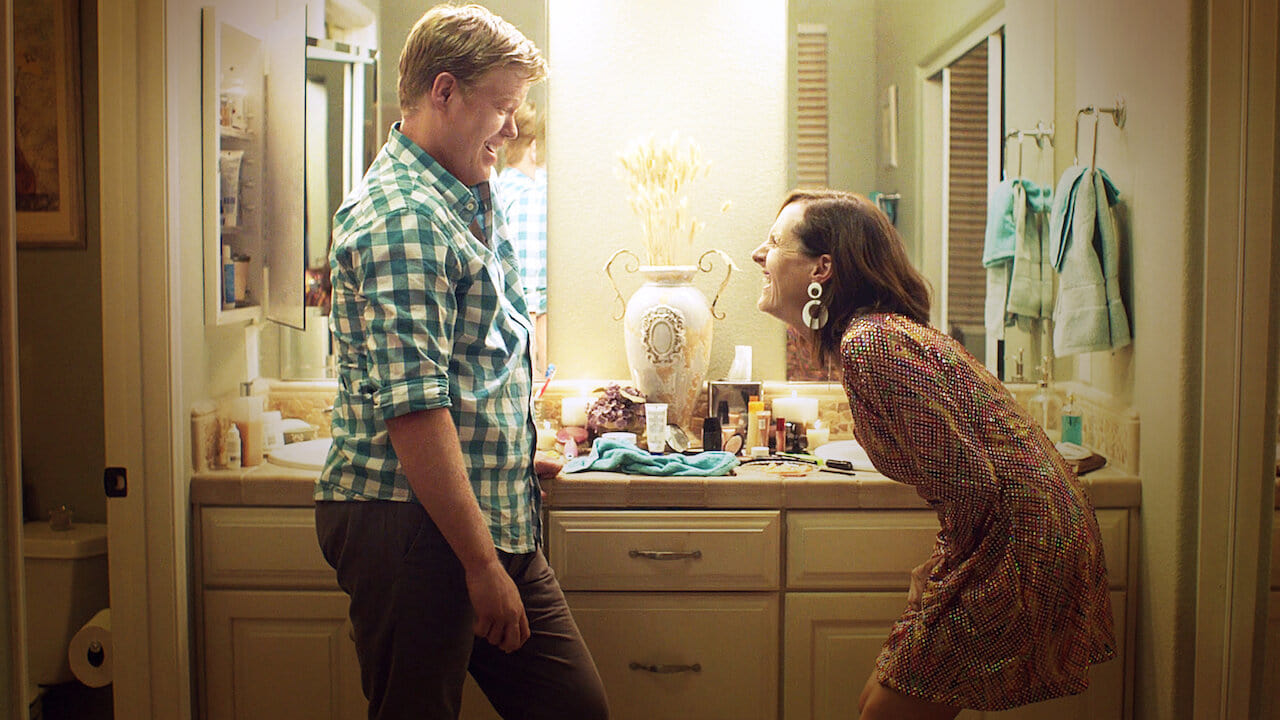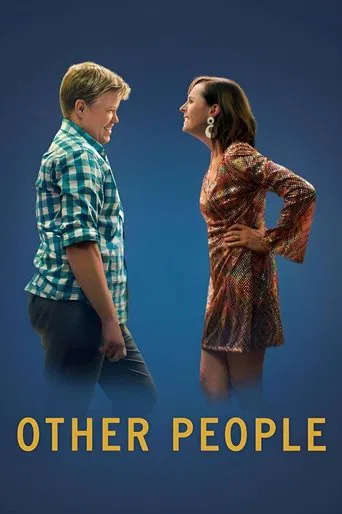

IMDb.com classifies this 2016 film as a comedy/drama. Well there are one or two laughs but they are of the nervous variety. The focus here is on drama. A struggling comedy writer, played by Jesse Plemons is fresh off a breakup and in the midst of the worst year of his life. He returns to Sacramento, to the bosom of his family to care for his dying mother, Molly Shannon in an outstanding performance.Train's "Drops of Jupiter" features several times during the movie; the lyrics of which deal with someone dying. Lead singer Patrick Monahan has stated that the song was inspired by his late mother, who had died after a struggle with cancer. It is apt.Other People is writer Chris Kelly's first big screen outing as director. He is also currently an Emmy-nominated Co-Head Writer at "Saturday Night Live". Other People debuted at the Sundance Film Festival in 2016. Molly Shannon won Best Supporting Female at the 2017 Film Independent Spirit Awards while Jesse Plemons was nominated for Best Male Lead; Chris Kelly for Best First Screenplay and all deservedly so.Above all this is a human drama. Multi-layered, the story is about the illness and death of the family's mother from cancer. It also deals with the father's reaction and his lack of acceptance of his son being gay. To borrow a line from Captain Kirk in Star Trek II: The Wrath of Khan – "how we deal with death is at least as important as how we deal with life"Have the tissues ready.A solid 4 out of 5.
... View MoreKimberly Jones of The Austin Chronicle explains the title of Chris Kelly's new dramedy: "For the lucky ones, untouched by tragedy, bad things are what happen to other people." Kelly's protagonist, David Mulcahey (Jesse Plemons) is a failing New York based gay comedy writer who returns to his Sacramento suburban home to take care of his mother Joanne (Molly Shannon), dying of a rare cancer. As Jones informs, David's "other people" now "become his people."Kelly realizes that an unrelenting story about a cancer victim and how it affects friends and family might become a little too heavy-handed for his audience to tolerate for the duration of an entire feature film, so he injects a modicum of humor to balance things out. Unfortunately not all of the humor hits the mark—Erin Whitney of Screen Crush asks us to consider the opening scene where David and the rest of his family-- including his distant, gay-aversive father and younger sisters--are lying in bed, crying for their dying mother: "A friend who has just learned of Joanne's cancer leaves a heedless voicemail, wishing the now-dead Joanne good health while arguing with a Taco Bell employee in a drive-thru." For Whitney, "this is the type of hollow humor that underlines much of Other People, a would-be dramedy that's too removed and too safe to leave a lasting impression."Whitney echoes the main criticism of Other People by those critics unimpressed by Kelly's protagonist, modeled on his own experiences: "it's much more about its lead character wallowing in self-pity. David expresses so much contempt for those around him; Sacramento folk, his family, every guy on OKCupid, and a hometown acquaintance with writing aspirations, but much of his sorrow lacks real passion." A.A. Dowd of A.V. Club wisely argues that the focus on David's self-pity leads to the lack of development of other characters: "But the bigger problem may be David himself, who's a bit exhausting in his self-pity...'I'll have no mom, no dad, no boyfriend, no job,' David whines early on—and if Other People is willing to occasionally acknowledge his selfishness, it also adopts his tunnel vision so completely that few other characters (including David's younger sisters, one of them played by an Apatow daughter) ever gain much dimension."Justin Chang notices the inconsistency in some of the characters: " It's the sort of movie that treats David's grandparents (June Squibb, Paul Dooley) as senile comic targets one minute and spouters of sentimental wisdom the next."But Keith Watson in Slant Magazine argues that Other People is at its sharpest when David's family and friends step on the stage: "While these characters exist primarily to teach David various lessons (be more confident, put yourself out there, reconnect with your family), Kelly provides his actors with enough space to make an impact. J.J. Totah, for example, steals every scene he's in as a flamboyantly gay tween who at one point performs a wildly inappropriate drag show to politely perplexed silence."Most of the critics agreed that it was Molly Shannon's performance as David's afflicted mother that gives the film its gravitas. Watson in Slant points out: "Shannon's performance locks into the film's most fully realized theme: that even the grueling misery of dying cannot rob you of a sense of humor if you don't allow it to." And Chang in Variety seconds Watson's comments: "Even with her face pale and gaunt, and her head shaved, the character possesses a luminosity that seems to glow all the more brightly as her condition worsens, as if in defiance of the cancer's steady onslaught."A.A. Dowd argues that Other People has great value in its frank treatment of the effect on people who must deal with an afflicted cancer victim: "it's at its best when getting into the nitty-gritty of coping with the disease—from an uncomfortably frank discussion of burial arrangements to the family serving as interpreter for a fading Joanne, repeating everything she croaks out in a hoarse whisper to those outside their immediate circle."Perhaps the most revelatory scene in Other People is David's supermarket melt-down. Everything that's been bothering him including his father's rejection of his sexuality, his recent break-up with his gay lover, rejection of his script by TV network professionals and especially his mother's sad decline, adds to the inevitable moment when he breaks down and blurts out he's a "good person." The sub-text to that statement of course is "why am I a victim?" as well as "why am I not successful?" There is something very self-pitying about David and he evinces a clear lack of insight into his situation. Indeed he's a "good person" in the way he takes care of his dying mother. But his desire for success is forced—not only does he try too hard but he's too focused on himself. Hence, David ends up the least interesting character in Kelly's narrative, not only for his self-pity but his narcissism as well.As some critics have argued, Other People's main character is in effect too much of a sad sack to interest us. If there's any redemption, it's in the portraits of some of the supporting players, especially Molly Shannon as a cancer victim who brings both mirth and a quiet dignity to a most difficult role.
... View MoreI usually watch movies after I've read reviews. I didn't do that with this one and I wish that I had. In a short review (as I am still watching this), this is a movie about a woman dying from cancer. Her children come home to spend the holidays and her last days, with her. I was hoping for a comedy that would bring out good spirits to a situation that is so unfortunately inevitable, but I got a lack of comedy and a gay film. That's basically all I can say about this film. I have to keep typing to meet the 10-line requirement. I'm so glad that I did not suggest this film for the family, as there is no comedy; only soft gay porn.
... View MoreRarely am I surprised by a film. Even less rare am I left speechless. It has already all been done and said, right? Turns out the answer to that question is no. This incredibly brilliant and quiet film reintroduces family and humanness to a world that desperately needs to see the transformative power that tragedy and suffering can bring to a family and community. Molly Shannon is a revelation. She is purely breath-taking in her nuanced and authentic performance. The family that surrounds her in this film is brilliantly cast and subtly and not so subtly used to portray emotion and experience and raw realness. I cannot wait to see this film again and to share it with everyone I care about.
... View More